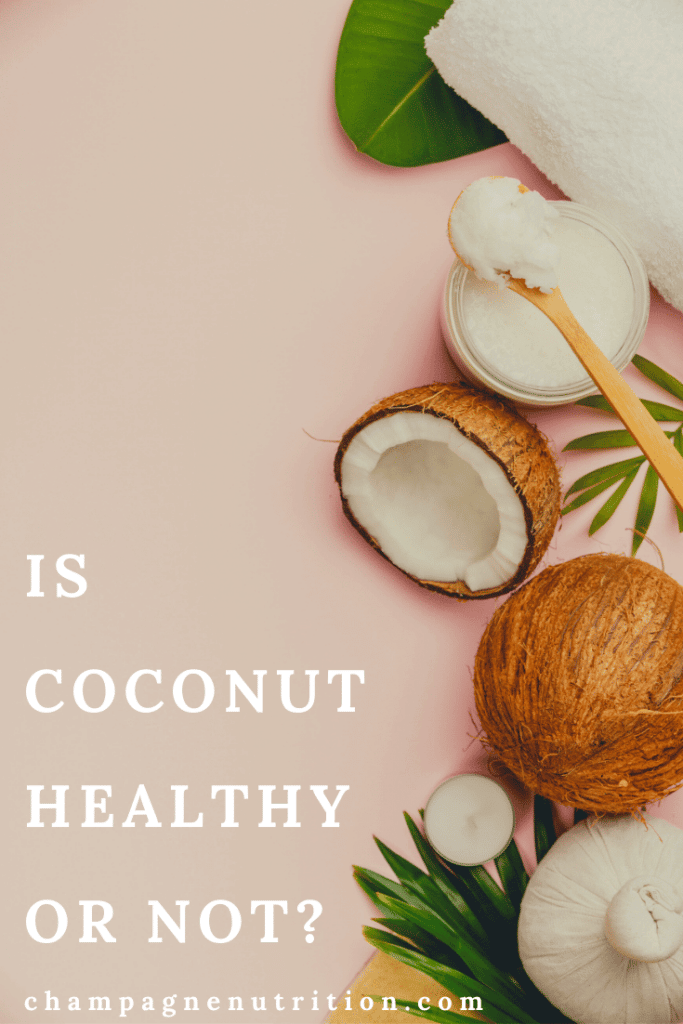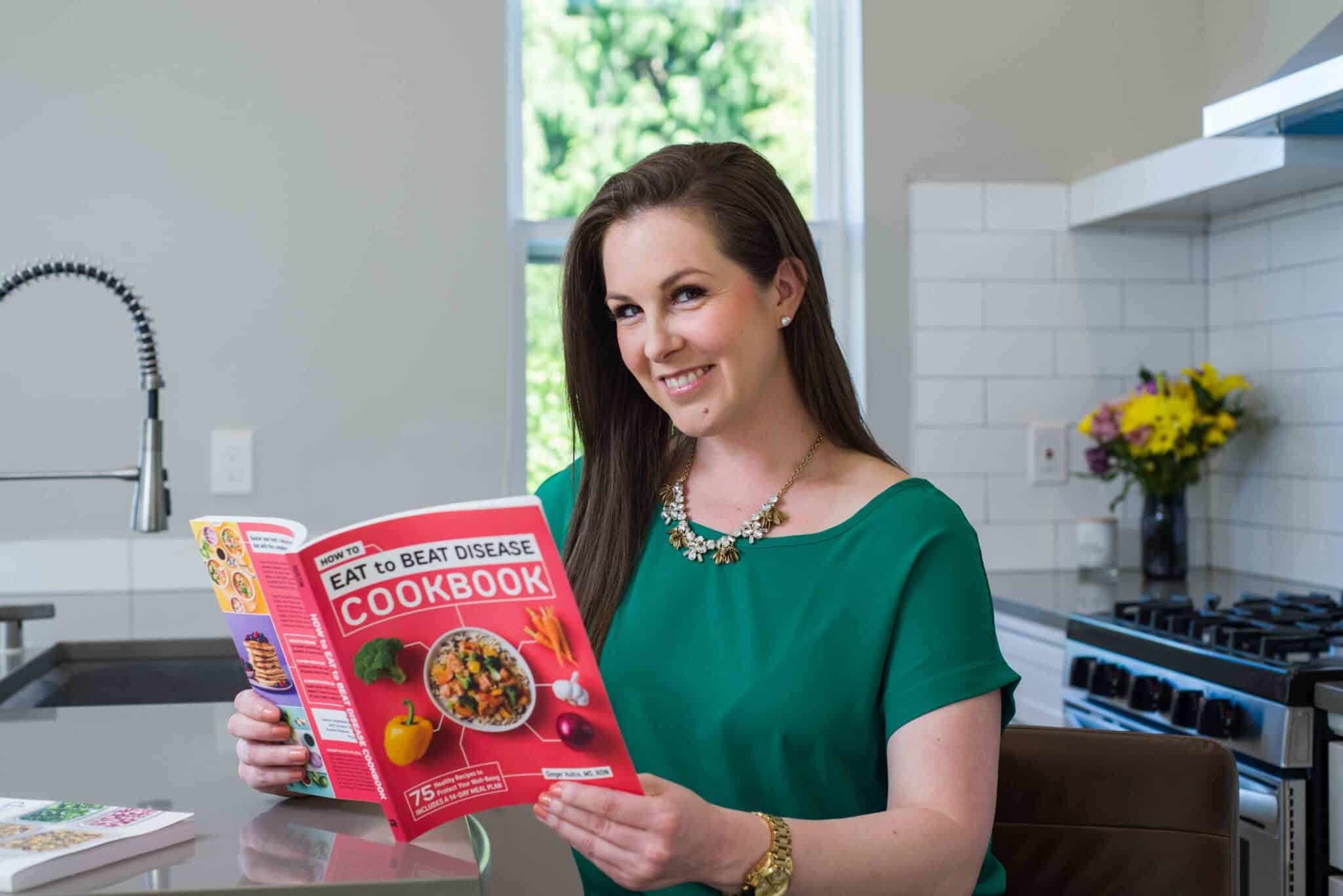Is Coconut Healthy or Not?
February 2, 2019 by Ginger Hultin MS RDN
You’ve still got questions about coconut and I’m here to break it down for you. Coconut comes in many forms and can be used in and out of the kitchen. Did you know that coconut husk can be used to make mats, brushes and rops, as well as, burnt to repel mosquitos? In the kitchen, coconut is a versatile ingredient that can be used in any meal of the day. While some speak of coconut almost as if it’s magical, it’s not a universal cure-all. In. So: Is Coconut Healthy or Not? Here’s what we know.
The Basics
When you hear “coconut”, what comes to mind? You may think of actual coconut meat, coconut oil, coconut flakes….these kinds of foods. And you’re right! You should also be thinking about coconut milk, coconut cream, coconut oil and it’s derivative, “MCT”. Coconut contains high levels of saturated fat, but tastes great and has many uses in recipes and cooking.
- Coconut Meat is the white flesh inside the coconut shell. It can be scraped out or cut into pieces and eaten raw. It is also commonly dried and shredded for use in baking or as a topping.
- Coconut Water is the clear liquid in the center of young, green coconuts. Don’t be fooled by the term water, coconut water contains about 46 calories per cup.
- Coconut Milk is made from grated coconut meat and water. The grated coconut meat is soaked and then pressed through cheesecloth to separate the liquid from the meat.
- Coconut Cream is a product of the coconut milk making process. As the coconut meat soaks in water, the cream rises to the top and is scraped off before pressing the meat to make milk.
- Coconut Oil can be made from either fresh or dried coconut meat, it is pressed to separate the oil from the rest of the meat. Coconut oil is 100% fat with up to 90% being saturated fat. In comparison, butter is 80% fat with about 63% being saturated fat.
- MCT stands for ‘medium chain triglyceride’ and it’s more like a supplement. You’ll find it in health food stores or supplement aisles. It’s a clear, odorless liquid that people add to shakes or coffee (it shouldn’t be heated or cooked with). I’ve mostly used it in the clinical hospital setting because it’s useful for some injuries. It’s quite high in calories. It can also give you diarrhea so use caution.

Are Coconut Oil and MCT Oil the same?
Coconut oil and MCT oil are sometimes used interchangeably, but they are not the same. MCT oil is derived from coconut or palm kernel oil through a refining process that removes everything except the MCTs. Coconut oil is about 54% MCT, it also contains LCT (long-chain triglyceride) and some unsaturated fats.
Here are some coconut-related pieces I’ve written or am featured in for additional balanced, evidence-based info on both coconut and MCT oil:
USA Today Coconut Oil Still isn’t Healthy
Food&Nutrition Magazine MCT Oil: Miracle Supplement?
Vitamin Shoppe Coconut Oil vs MCT
Daily Burn Coconut Vinegar for Probiotics
One thing you might notice people exploring in these pieces is this all-or-nothing, black-or-white, healthy-or-not approach. Will coconut oil kill you or cure you? What about MCT oil? These are the kind of questions I get as a registered dietitian nutritionist, I’m afraid it’s more complicated than that. It’s hard to study what people eat. How much coconut oil or MCT are they consuming? What else are they eating all day every day? Do they exercise? Smoke? Drink? Sleep? What’s their metabolism like? What are their genes doing?
What about Bulletproof Coffee?
Touted to boost energy in the morning to fuel your brain for the day, what you’re supposed to do is to brew coffee (preferably “Bulletproof coffee beans”) and then add 1-2 tablespoons of “Brain Octane Oil” which is in fact MCT oil and 1-2 tablespoons of butter or ghee. Blend this into a latte and enjoy. They recommend enjoying this beverage which has 12-24+ grams of saturated fat as well as caffeine to provide energy in the morning rather than eating the typical carbohydrate-rich breakfast – think oats, toast, cereal, etc. Oil is packed with calories so a Bulletproof coffee can have 400-500 calories. Since it IS a meal replacement, that’s not bad but it just really depends on if this gets you through your morning or not. Each person will be different, as always. I see Bulletproof as a facet of intermittent fasting and also of the desire to put the body in ketosis. See my ketogenic diet blog for more info on how coconut oil plays a role.
I love coffee. If you love coffee and especially if you enjoy rich coffee that has butter and oil in it, more power to you. Just know that you’re getting a LOT of saturated fat in this product and depending on your unique needs, that may or may not be a good thing. By eliminating carbs at breakfast, you’re also cutting out a lot of vitamins, minerals, antioxidants and fiber so consider what the rest of your day looks like. And I hope it looks like: tofu, beans, lentils, veggies, fruits and whole grains.
Is coconut healthy or not?
The American Heart Association recommends saturated fat in the diet be limited to 5-6% of total calories. On a 2000 calorie diet, that’s 11-13 grams per day. One tablespoon of coconut oil has 12 grams of saturated fat so yeah…it adds up. I never recommend my clients drink it in smoothies or add it to every recipe throughout the day. I think the American Heart Association’s recommendation to include saturated fat, but limit it to 5-6% of total calories makes sense. There are many other types of fats and oils that aren’t saturated that should be in the diet as well: olives, olive oil, nuts, seeds, avocado, avocado oil – fun foods! It really depends on your personal health history, family history, labs and goals, like so many nutrition recs, it’s hard to tell you for sure yes or no you should or should not eat coconut without meeting with you 1:1 to discuss.
Whenever I talk to people about being aware of the fat in their diet, I often get push-back about what happened in the 1990’s when we replaced fat with sugar and refined carbohydrates. I don’t think any health care provider would state that went well – it didn’t. Sugar shouldn’t be replacing anything generally. What I see sometimes now is people including more saturated fat in the diet and there are some benefits – feeling full and satisfied for one. Sometimes though, as people liberalize fat in the diet and start eating more, they either maintain their current sugar/refined carbohydrate status or even add in more (remember – many saturated fat sources are rich in sugar too – baked goods or chocolate for example).
Bottom Line on Coconut
Just like with the ketogenic diet, I want to tell you here exactly what I think of it, as a nutrition expert. I think coconut oil is delicious! I use it in cooking. I have a jar of it and it lasts me about a year. I use it to grease pans or for stir-fries maybe 2-3 times per month. I use shredded coconut in recipes a couple times per month. It’s a beautiful garnish and adds a nice complexity of texture and flavor. I use coconut oil moderately and I feel great about it because I use a variety of other fats, too.
I do not use MCT however – it can cause stomach upset, it’s very rich in calories and I don’t see a reason to use it for my needs. I have suggested it clinically, for very ill people in the hospital for a variety of reasons so my suggestion is generally to use it if it’s medically necessary for you but otherwise, stick to whole food sources of coconut products. I also don’t do Bulletproof coffee – I drink coffee with a slash of soy or oat milk and that works for me. I feel energized in the mornings.
Coconut Recipes
If you want some of my favorite coconut recipes, I’ve got them here for you. Enjoy!
No Bake Vegan Chocolate Haystack Cookie Bites
Coconut Lemon Curd Overnight Oats
Tropical Mango Chia Pudding Parfait
Easiest Blueberry Coconut Oatmeal Bake
Coconut Cherry Almond Energy Oat Balls
I would love to know what questions or thoughts you have about coconut oil, MCT, or Bulletproof coffee– let me know in the comments!
9 Comments
Leave a Comment

Ginger Hultin,MS, RD, CSO
Thanks for visiting! If you're struggling with a cancer diagnosis, autoimmune condition, gut health problems, or even a medical mystery, nutrition can make a HUGE difference in your day-to-day life. I run a virtual, concierge private practice where I partner with my clients over time to help them improve their health through nutrition. Be sure to visit the blog for easy, plant-based, anti-inflammatory recipes and our "Resources" page for a variety of self-paced programs, books, e-books, and nutrition podcast episodes.

Great overview! I feel the same way about coconut oil. I did a research paper on coconut oil in grad school and was SHOCKED at the lack of data on coconut oil (for how much hype there is!). Basically, an extrapolation of data on pure MCT, which… coconut oil is not pure MCT. Tuned into your FB live earlier too!
Ahhh thank you lady! Yes, it’s so important to be really clear about WHAT you’re talking about when you say “coconut” – people mean all sorts of things. So interesting!
I have a fatty liver, confirmed something like a MRI scan. my reason for reading your blog. 64 yrs with high blood pressure 2 medications. Eat fish only lots of veggies and fruit, water. Never alcohol, smoking, drugs. Some what active. Fungus feet bad many years. Constipation many years. Scar tissue operation didn’t help much with bowels. Blood pressure stable, stopped salt, working hard on sugar. Don’t do bread, rice, pasta maybe once every 6 months if that. My doctor says it’s nothing. But reading I know it’s something. Any suggestions.
Hi Karen – if you’d like to discuss a nutrition consult to address your health concerns, please reach out via my contact page and we can set up a call to see how I can best help you with your goals.
Thanks for breaking down the ins & outs of coconut! I agree that coconut oil definitely makes recipes tasty and has benefits in cooking. Definitely not in coffee!
I like the way it flavors things in baking and cooking so it’s a staple in our kitchen. Thanks for sharing!
Me too! Thank you – I use it in some dishes in my rotation and it works well!
Love the reminder that it’s never so simplistic as whether one particular food is “good” or “bad” 🙂 PS – a family member tried adding MCT oil to their coffee one morning… and let’s just say that your diarrhea warning is legit! lol
Oh girl – thanks for sharing that. I think that people underestimate what these add-ins can do to the body. Yikes!